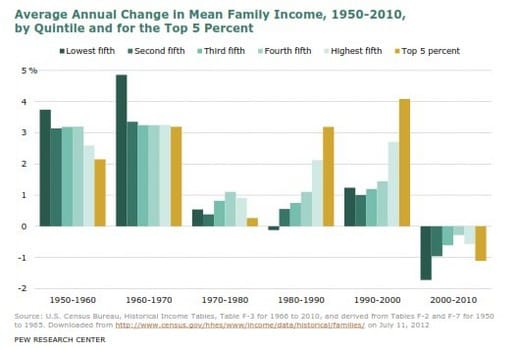Fall of the Middle-Class: What a Difference Ten Years Makes


The greatest casualty of this slowly recovering economy has been the fall of the middle-class, but the decline did not begin in 2007 or 2008. The past decade has been the most financially unstable for the middle-income tier since World War II. At least that is the take-away from a recent Pew Research Center study about household income and net worth. The election is 75 days away, but President Obama had set up a Middle-Class Task Force since February 27, 2009 to tackle the issues that plague the majority of Americans. They began with green jobs and tax cuts, but the gridlock between the administration and Congress has led to less than expected results. As a result, just over half (52%) of middle-class voters feel that the President's policies will help over the next four years. That still is better compared to the 42% of self-perceived middle-class voters feel about Gov. Romney's policies.
In terms of how Obama's and Romney's policies are perceived as benefiting the upper-class, the Pew Research Center's report shows the opposite. Romney gets the edge in this category, where the respondents perceive the Republican candidate's policies benefiting the President's 71% to 38%, respectively. This plays into Chicago's message that Romney favors the millionaires and billionaires over the majority of Americans.
Fully 85% of Americans who describe themselves as middle class say it is more difficult now than it was a decade ago for middle-class people to maintain their standard of living. This downbeat take comes at the end of a decade in which mean family incomes declined for Americans overall for the first time since the end of World War II.
The decrease in middle-class confidence also coincided with the upper income tier taking a substantially larger slice of the nation's household income pie. While the middle-class lost 17% since 1970, the upper-class gained 17 points in household income, from 29% to 46%, juxtaposed with the, middle-class' decline from 62% to 45%.
But only the upper tier has increased its share of the nation's total household income. In 2010, the upper tier took in 46% of the nation's household income, up from 29% in 1970. In 2010, the upper tier took in 46% of the nation's household income, up from 29% in 1970. The middle tier took in 45%, down from 62%.
Even though the research was conducted prior to Gov. Romney selecting Rep. Paul Ryan as his running mate, that pick does not change how the survey respondent's felt over the past several years. Even though the past decade can be seen as a decline for the middle-class, in general it may not feel like the rise of any other class. The global recession made sure of that and the next president, whoever it will be, will have to find a way to help more than just the middle-class.


